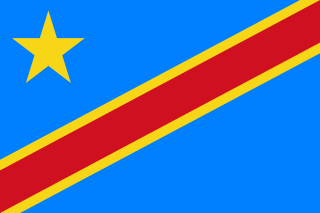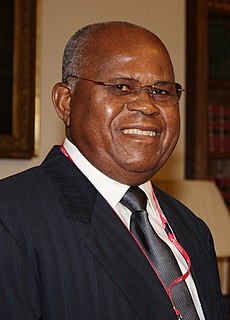Discovered in the 1990’s, human remains in the Democratic Republic of the Congo have been dated to approximately 90,000 years ago. The first real states, such as the Kongo, the Lunda, the Luba and Kuba, appeared south of the equatorial forest on the savannah from the 14th century onwards.

Politics of the Democratic Republic of Congo take place in a framework of a republic in transition from a civil war to a semi-presidential republic.

The Democratic Republic of the Congo (DRC), also known as Congo-Kinshasa, DR Congo, the DROC, the DRC, or simply either Congo or the Congo, and formerly Zaire, is a country in Central Africa. It is, by area, the largest country in sub-Saharan Africa, the second-largest in all of Africa, and the 11th-largest in the world. With a population of around 105 million, the Democratic Republic of the Congo is the most populous officially Francophone country in the world, as well as the fourth-most populous country in Africa and the 15th-most populous country in the world. It is a member of the United Nations, Non-Aligned Movement, African Union, and COMESA. Since 2015, the Eastern DR Congo has been the site of an ongoing military conflict in Kivu. The capital and largest city is Kinshasa.

Joseph Kabila Kabange is a Congolese politician who served as President of the Democratic Republic of the Congo between January 2001 and January 2019. He took office ten days after the assassination of his father, President Laurent-Désiré Kabila in the context of the Second Congo War. He was allowed to remain in power after the 2003 Sun City Agreement ended the war. He was elected as president in 2006 and re-elected in 2011 for a second term. Since stepping down after the 2018 election, Kabila, as a former president, will be a senator for life, according to the Constitution of the DRC.

Étienne Tshisekedi wa Mulumba was a Congolese politician and the leader of the Union for Democracy and Social Progress (UDPS), the main opposing political party in the Democratic Republic of the Congo (DRC). A long-time opposition leader, he served as Prime Minister of the country on three brief occasions: in 1991, 1992–1993, and 1997.
The Movement for the Liberation of the Congo is a political party in Democratic Republic of the Congo. Formerly a rebel group operating in the Democratic Republic of Congo that fought the government throughout the Second Congo War, it subsequently took part in the transitional government and is one of the main opposition parties.

General elections were held in the Democratic Republic of the Congo on July 30, 2006. They were the first multiparty elections in the country in 41 years, and the first since the overthrow of longtime leader Mobutu Sese Seko nine years earlier. Voters went to the polls to elect both a new President of the Republic and a new National Assembly, the lower-house of the Parliament.

Gubernatorial elections were held in the Democratic Republic of the Congo on 27 January 2007, though they were originally scheduled for 16 January and 19 January. The governors and vice-governors were chosen through indirect election by the members of the provincial assemblies; the delay was a result of the difficulties in choosing traditional chiefs to fill the places reserved for them in the provincial assemblies. The second round of voting would only have been necessary in those cases where no candidate had received an absolute majority in the first round, which was not the case anywhere. However, voting was rescheduled in Kasai-Occidental and Kasai-Oriental on 10 February to 15 February, because the Union of the Nation candidates were disqualified because they held dual citizenship.

Bundu dia Kongo, known as BDK, is a new religious movement with a political and cultural agenda that is associated with the Kongo ethnic group. It was founded in June 1969 by Ne Muanda Nsemi, who is the group's current leader, and is mainly based in the Kongo Central (Bas-Congo) province in the Democratic Republic of the Congo. The movement supports Kongo nationalism and the creation of an ethnically-Kongo state that would encompass parts of the modern-day Democratic Republic of the Congo, Angola, Gabon and the Republic of the Congo.

Corruption in the Democratic Republic of the Congo, once legendary, has diminished in recent years, but continues to exceed corruption in most states. The BBC's DRC country profile calls its recent history "one of civil war and corruption." President Joseph Kabila established the Commission of Repression of Economic Crimes upon his ascension to power in 2001.

The Republican Guard of the Democratic Republic of the Congo, formerly known as the Special Presidential Security Group, is maintained by President Félix Tshisekedi. Military of the Democratic Republic of the Congo (FARDC) military officials state that the Garde Républicaine is not the responsibility of FARDC, but the Head of State. Apart from Article 140 of the Law on the Army and Defence, no legal stipulation on the DRC's Armed Forces makes provision for the GR as a distinct unit within the national army. In February 2005, President Joseph Kabila passed a decree which appointed the GR's commanding officer and 'repealed any previous provisions contrary' to that decree. The GR is more than 10,000 strong, and formerly consisted of three brigades, the 10th, at Kinshasa, the 15th, and the 16th, at Lubumbashi. It has better working conditions and is paid regularly, but still commits numerous crimes near their bases, including against United Nations officials.
General John Numbi is a Congolese military officer. Until January 2010, he was the Inspector General of the Congolese National Police. In 2018 he was appointed as the Inspector General of the Armed Forces of the Democratic Republic of the Congo (FARDC).
Médard Mulangala Lwakabwanga is a politician from the Democratic Republic of the Congo. He is President of the Union for a Republican Majority and a leader of the Union Sacree pour l’Alternance, an umbrella grouping of opposition parliamentary parties and community groups that forms the third-largest political structure within the opposition and Rapporteur of the National Assembly’s Committee on Economics and Finance, making him the opposition’s lead spokesman on budgetary, economic and investment policy in the Republic.

Senate elections were held in the Democratic Republic of the Congo on 14 March 2019 to elect the 108 Senators. Former DRC President Joseph Kabila, who stepped down from office in January 2019 following the inauguration of the recently elected Félix Tshisekedi, has also joined the upper house of the legislature as a senator for life, for a total of 109 seats.

General elections were held in the Democratic Republic of the Congo on 30 December 2018, to determine a successor to President Joseph Kabila, as well as for the 500 seats of the National Assembly and the 715 elected seats of the 26 provincial assemblies. Félix Tshisekedi (UDPS) won with 38.6% of the vote, defeating another opposition candidate, Martin Fayulu, and Emmanuel Ramazani Shadary, backed by the ruling party PPRD. Fayulu alleged that the vote was rigged against him in a deal made by Tshisekedi and outgoing President Kabila, challenging the result in the DRC's Constitutional Court. Different election observers, including those from the country's Roman Catholic Church, also cast doubt on the official result. Nonetheless on 20 January the Court rejected his appeal and declared Tshisekedi as the winner. Parties supporting President Kabila won the majority of seats in the National Assembly. Félix Tshisekedi was sworn in as the 5th President of the Democratic Republic of the Congo on 24 January 2019, making it the first peaceful transition of power in the country since it became independent from Belgium in 1960.
Samy Badibanga Ntita is a Congolese politician who was Prime Minister of the Democratic Republic of the Congo from November 2016 to May 2017. He was also on the ballot for the 2018 Democratic Republic of the Congo general election as a presidential candidate.

On 20 December 2016 the Democratic Republic of the Congo's president, Joseph Kabila, announced that he would not leave office despite the end of his constitutional term. Protests subsequently broke out across the country, which had never had a peaceful transfer of power since it gained independence in 1960. The protests were met with the government's blocking of social media, and violence from security forces which left dozens dead. Foreign governments condemned the attacks against protesters.
Odette Babandoa Etoa is a Congolese opposition politician and former government minister. She has been given the nicknames "Joan of Arc" and the "Iron Lady".

Ève Bazaiba Masudi is a Congolese lawyer, politician, and human rights activist. As of May 2019, she served as the Secretary General of the Movement for the Liberation of the Congo (MLC) political party.
Emmanuel Ramazani Shadary is a politician in the Democratic Republic of the Congo, who was a presidential candidate in the December 2018 presidential elections in the country. He was selected following consultations within the ruling People's Party for Reconstruction and Democracy (PPRD) political party and the Common Front for Congo (FCC), political coalition. Shadary is the permanent secretary of the PPRD, and has previously served as the country's Interior Minister.










